#billaud varenne
Text

I am geographically challenged, and I really, really wanted a way to visualise what constituencies the members of the Third Committee of Public Safety ( July 1793 – July 1794) represented. So, this map was born.
Bertrand Barère: Hautes-Pyrénées
Jacques Billaud-Varenne: Paris
Lazare Carnot: Pas-de-Calais
Jean-Marie Collot: Paris
Georges Couthon: Puy-de-Dôme
Marie-Jean Hérault de Séchelles: Seine-et-Oise
Robert Lindet: Eure
Pierre-Louis Prieur de la Marne: Marne (hence the name…)
Claude-Antoine Prieur: Côte-d'Or (ditto)
Maximilien Robespierre: Paris
André Jeanbon Saint-André: Lot
Louis Antoine de Saint-Just: Aisne
PS: It’s fascinating and telling how many of them represented provinces in the north of France.
#frev#robespierre#french revolution#couthon#barere#collot#billaud varenne#herault#lazare carnot#saint just#saint-andre#Committee of Public Safety#priuer
76 notes
·
View notes
Text
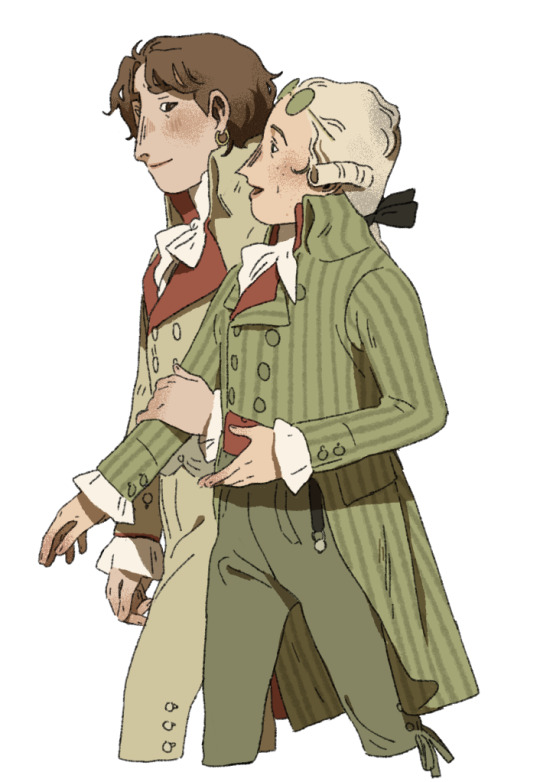
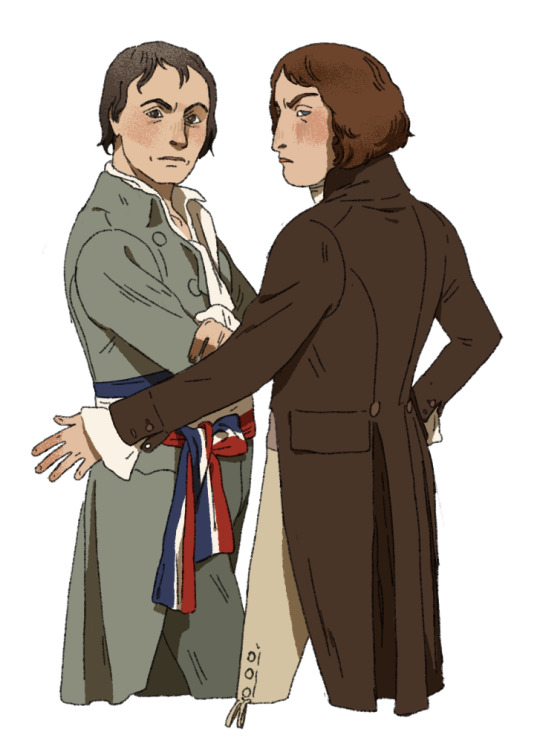
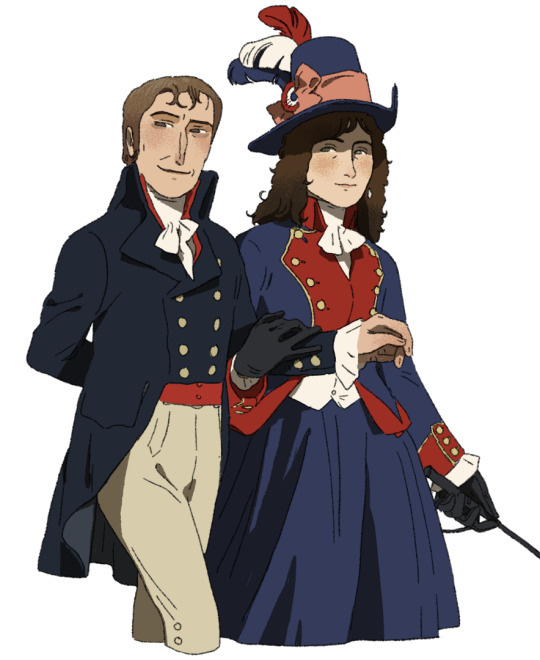
Happy Valentine's Day!
#french revolution#personal work#personal art#robespierre#saint just#charlotte robespierre#fouche#billaud varenne#collot d'herbois
742 notes
·
View notes
Text
I wonder if, being of a similar height to Robespierre, he ever had the same short-people-problems I sometimes have.
(although I admit I've never come against any 'intimidating your political opponents' problems)
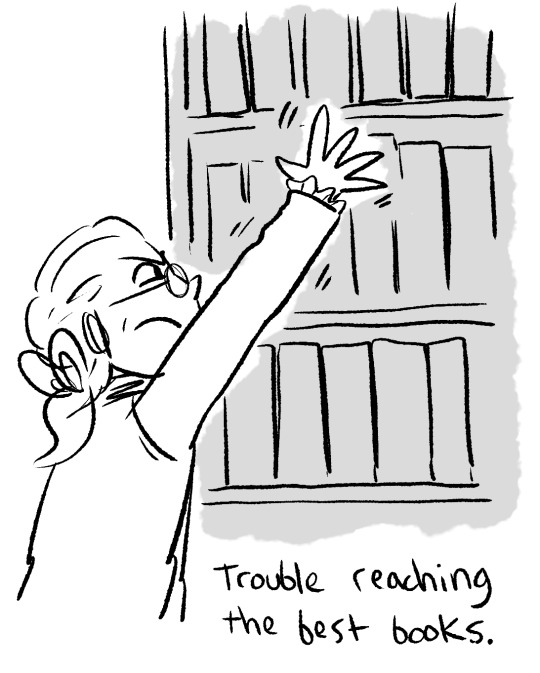
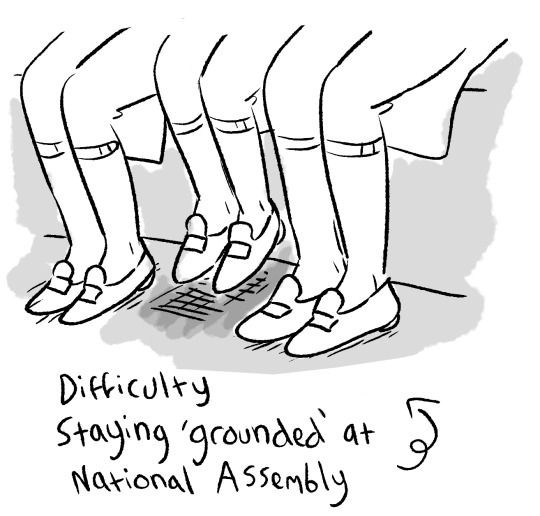
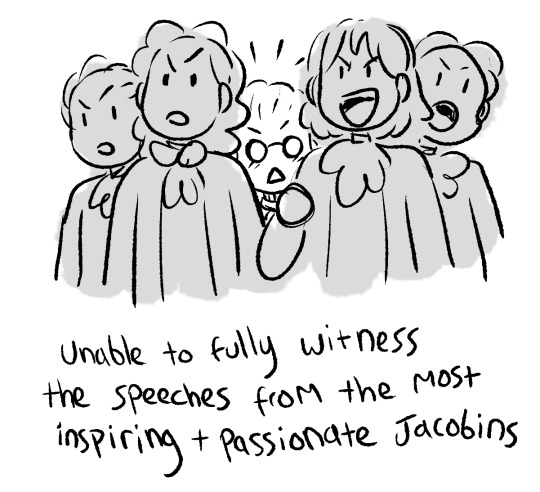
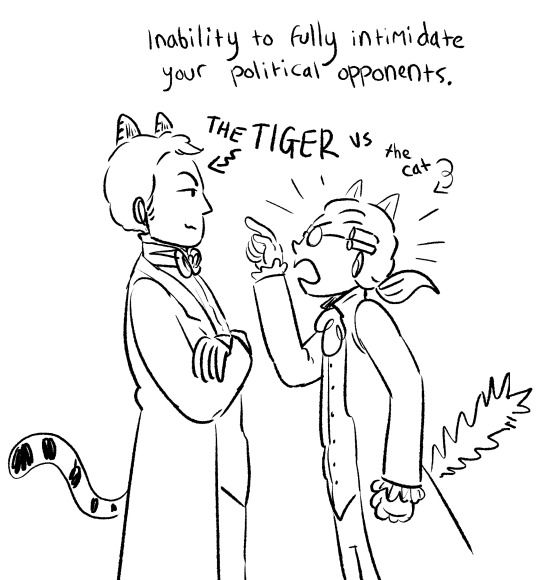
#apparently I'm only one inch shorter than robespierre#french revolution#frev art#frev shitposting#robespierre art#robespierre#maximilien robespierre#billaud varenne#french revolution art#frev doodle
148 notes
·
View notes
Text
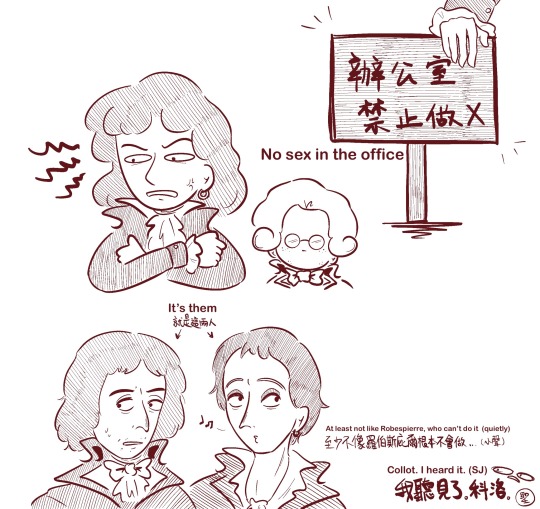
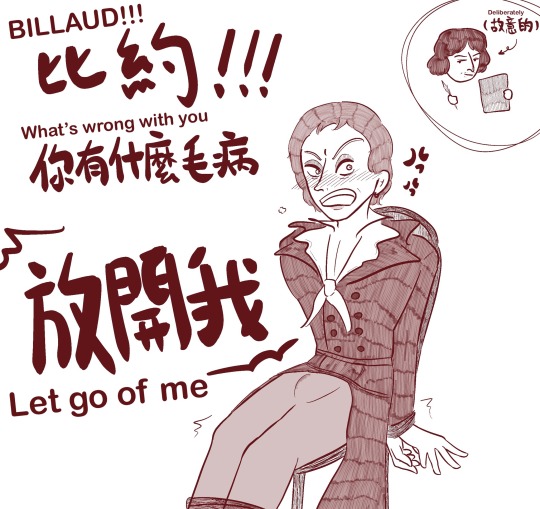
I hate that they are such a perfect match😩
(I am tired of changing handwriting into English, please allow me to use typing)
75 notes
·
View notes
Text
Some time ago in an excellent reblog by Brissot in which each of the good additions was added for which I would like to thank you all, I became a "lawyer" for Marie Antoinette by trying to defend her on quite a few points while not denying her errors and her betrayal (if you want I can give you this post). This got me an idea: I plan to try to do one on Manon Roland and Billaud Varennes, who do you want me to do first (for the moment I do not yet have sufficient information on Jacques Roux and I have taken a certain way of defending people like Momoro, Chaumette, Ronsin in my post the difference in treatment between the Indulgents and the Hébertists, Cordeliers). If you want me to write about another well-known character, let me know (on the other hand, I do not defend a Fouché, a Carrier, Tallien, Fréron,Barras,Collot, Barere, a Hébert and it would be very difficult to take a defence for La Fayette or even Napoléon for me).
29 notes
·
View notes
Note
(its the TMI anon from earlier) This feels like a fever dream but I remember hearing that Marat wrote a pamphlet about how he had a virtuous early life so he said he never jerked off like people his age would (better confession than the guy who said he did it at church ig...I would have taken that to the grave. How can one say that with no shame?). I'm curious about Herault's oversharing too now that you've mentioned it
OOh, oh of course, how could I forget Billaud-Varenne's story of experimenting with other boys, being asked to repent but getting horny at a statue of Madonna nursing baby Jesus and doing self pleasure as a result? (I think it's supposed to be a ~fictional work? But still).
Marat I am not sure where he talked about it, although "not jerking off" was seen as a sign of pride - they believed masturbation was wrong (unlike, say, visiting prostitutes).
Hérault, sadly, did not overshare (full disclosure: I would love to read his oversharing, tbh. But there's not much (?) Unless you count the mess that is "The Theory of Ambition").
29 notes
·
View notes
Text

An elder-version Billaud? Well, the facial features in this portrait are so much alike. And from this portrait, he did not look serene like Prieur or Carnot.
I don't find any other resources to prove that the portrait may be mislabeled.
Found it here:
15 notes
·
View notes
Note
Hi,
In a lot of books I've read that the three members of the Committee of Public Safety most intent on having the Dantonists executed were Barére, Billaud-Varenne and particularly Saint-Just; however, I have never seen a sufficient explanation as to why. (I know about the gossip such as the Sillery affair or that Saint-Just and Desmoulins hated each other but I don't think such trivival things really contributed to them wanting to have the Dantonists executed.) Could you explain if it was really these 3 members who were hellbent on the whole affair and why the others might have been reluctant about it? Furthermore, about Lucile: to what extent is it true that the letter upon which her arrest was based was forged by Saint-Just? Because I have read that various times and also various times that Saint-Just had absolutely nothing to do with the letter. Can you please give me recommendations (books, articles) about the whole Dantonist affair because I feel that most I have read this far is incredibly biased or just simplistic.
Thnak you so much.
I have wondered the exact same thing, because you’re right, it has been stated by many historians that a certain number of CPS and CGS members (though not necessarily always the exact three you listed) were particulary eager to put down the Dantonists. This often gets contrasted with Robespierre’s alleged more hesitant reaction:
It was on the same day, perhaps, that, after much hesitation and many discussions at the Committee, [Robespierre] was at last persuaded by Billaud-Varenne and Collot d’Herbois to consent to the proscription of Danton.
Robespierre (1935) by JM Thompson
But the fate of the ‘Indulgents’ was still to be resolved. In late March there were desperate meetings between Robespierre and Danton as pressure mounted for arrests. Robespierre remained hesitant — what exactly was Desmoulins’ offence? — but Billaud and Collot, worried by what the proscription of Hébert and his allies might mean for them, were unrelenting.
Robespierre: a revolutionary life (2010) by Peter McPhee, page 190
In the government committees, the dabate has been vivid. Those most up in arms about Danton and those close to him have been Amar, Voulland, Billaud-Varenne and Collot d’Herbois, but it’s Saint-Just who has been assigned with writing a report against them.
Robespierre (2014) by Hervé Leuwers, chapter 21
Collot d’Herbois and Billaud-Varenne, who had both been close to the Cordeliers, argued fiercely that the Committee should strike down the Dantonists. For a long time Billaud-Varenne and Robespierre had been at loggerheads over this. For several months Robespierre resisted killing Danton.
Choosing Terror (2014) by Marisa Linton, page 218
But of all those listed here, Billaud-Varennes is the only one for whom I’ve found sufficient evidence when it comes to hostility towards the dantonists, as he on several times is recorded to have reported his eagerness when it came to silencing Danton. As can be seen, he does however never really give a satisfying answer as to why, other than the fact that he saw Danton as dangerous.
The first time I denounced Danton to the committee, Robespierre rose like a madman and said that he saw my intentions, that I wanted to lose the best of patriots.
Billaud-Varennes accuses Robespierre on 9 Thermidor 1794
Billaud-Varennes: If the misery of Danton is a crime, I accuse myself of it: because I was the first to denounce Danton; I said that if this man existed, freedom would be lost. If he were in this enclosure, he would be a rallying point for all counter-revolutionaries. Danton was Robespierre's accomplice; for the day before Robespierre consented to abandon him, they had been together in the countryside, four leagues from Paris, and had returned in the same carriage. I ask you if it is for few men that the Convention must vote at this moment. I declare that, if the intriguers, the thieves could have the upper hand, I would kill myself.
Les crimes des sept membres des anciens comités de salut public et de surete general (1794) by Laurent Lecointre, page 23
I repeat it for you, Danton is the only representative of the people whose punishment I provoked, since he to me seemed like the most dangerous of conspirators.
Réponse de J.N Billaud, représentant du peuple, à Laurent Lecointre, representant du peuple (1794) page 38
The last political opinions of Billaud corrected the old ones only on purely individual points. Thus, the death of Danton was then in his eyes a crime, because of the immense services he had rendered. "Alas!" he would often say, I was too directly involved in it and with a terrible hatred. The misfortune of revolutions is that you have to act too quickly; you have no time to examine: you act only in full and burning fever, in fear, I understand, of seeing your ideas aborted. Danton and his friends were clever people, invincible patriots at the tribune or in public action, and we massacred them! Unlike us, they did not, except for the brave Westermann, the Murat of the Republic, have their hands free from trafficking and plunder; they loved luxury too much but they had a noble and revolutionary heart; you will know their services one day, when the sincere history of our time is written. That of M. Lacretelle is only a work without facts, a work made up of a rhetorician. I remain with the intimate conviction that 18 Brumaire would not have been possible, if Danton, Robespierre and Camille Desmoulins had remained united at the foot of the tribune.
Billaud Varennes — mémoires inédits et correspondance (1893) page 236-237
There’s also the following claim said to originate from Billaud in McPhee’s Robespierre biography that I’ve honestly been interested in since the first time I read it. No source is cited and I’ve not yet been able to discover from where it comes:

On January 13, Billaud also openly opposed Danton when the latter defended the recently arrested Fabre d’Eglantine, exclaiming ”Woe to whoever sat next to Fabre d'Églantine, and who is still his dupe.”
For the rest of those mentioned however, I not only had a hard time finding reasons for them to be particulary against Danton, but also evidence they actually even were against him more than anyone else. Since private papers where they might have spoken their mind more freely barely appear to exist for most of these people, I’ve chosen to mainly look over the minutes from the Convention and the Jacobin club between December 1793 (when the bickering between the hébertists and dantonists began) and the dantonists’ execution in April 1794. That colorful and devisive opinions are hard to find here might not be all that strange given the fact they needed to appear somewhat unified before the public. But I would still say my findings are rather inadequate for the claims cited above.
Starting with Barère, we know that he on December 26 denounced Desmoulins (without mentioning him by name) when talking about ”periodical writers who […] revive the counter-revolutionaries, and warm the ashes of the aristocracy.” He did however also say that Camille was doing this ”unknowingly and perhaps unintentionally,” which is very similar to how Robespierre chose to defend him on January 7. On April 1 Barère also voiced his support for the dantonists’ arrest at the Convention, but nowhere near as strongly as Robespierre had right before him. These were the only times Barère actually said anything about the affair during these four months that I could discover… I also didn’t see Barère talk about any particular role he might have had in it in his memoirs, though given the nature of those kinds of publications that doesn’t have to mean very much.
Collot did him too denounce Camille’s journal without naming his name on December 23. He denounced him again on January 5, but opposed expelling Camille from the Jacobins, which had been suggested on both December 21 and December 31, saying that ”the aristocrats have pronounced that Camille Desmoulins would be driven out of the Jacobins: let that go; the club will judge in its wisdom what is to be done; but let us not forget what an old patriot has done for the public good.” He only proposed the journal be censored, which is again the same thing Robespierre would also later ask for. At the same meeting Collot did however ask for Philippeaux to be expelled from the club, something which Robespierre would instead declare unnecessary two days later, but this on the grounds that Philippeaux had never really been a worthy member anyway.
One rather common thesis is that Collot (and Billaud) were close to the hébertists and for that reason wanted to get rid of Danton, and even that getting Danton’s head was their ultimatum for helping obtain that of Hébert. As evidence for this is often listed the fact that Collot on December 21 openly defended the hébertist Ronsin who had been arrested four days earlier, was celebrated by Hébert in Le Père Duchesne as well as the fact that he on March 7 went to the Cordeliers Club to preach union with its members. In Collot d’Herbois: lègendes noires et révolution (1995), Michel Biard does however dismiss the idea that this can be used as evidence Collot himself was a hébertist, arguing that he defended Ronsin to protect himself since the latter had been his collegue in Lyon and not because he agreed with him politically (if he had, he also would have defended the other arrested hébertist Vincent) and that Hébert praising Collot doesn’t mean Collot praised Hébert.
As for Saint-Just, he was away from Paris during much of the period (From October 17 to December 4, December 10 to December 30, and finally January 22 to February 13). It was of course he who, with the help of Robespierre, had prepared the dantonists’ indictment, but that he also did for the hébertistswhy did they always get him to write all the important reports btw?
The CGS members Amar and Voulland I found to barely have spoken at all during the studied period. On February 2, it was however the latter who suggested setting the imprisoned hébertists Vincent and Ronsin free, which I suppose at least reveals which side he was on. Amar was in his turn the one who had written the report regarding the East India Company scandal, in other words the people the dantonists would end up getting executed alongside. Though curiously, when reading the report at the Convention on March 16 (the only time he is recorded to have spoken that I could find) Amar received criticism from both Billaud-Varennes and Robespierre, who claimed it too narrow since it only focused on the financial side of the affair. At the same time, Robespierre called on the Convention to defend its honor and purge itself of traitors on its midst and demanded that Amar’s report be revised to express these ideas… The article André Amar and his role in the Committee of General Security (1961) also didn’t mention anything in particular about its subject’s role in the dantonist purge.
All those listed had however been attacked by Desmoulins in his two more recent publications (Saint-Just, Barère and Billaud in Lettre au général Dillon, Barère, Collot, Amar and Voulland in Le Vieux Cordelier), and, like you said, SJ and Camille had also been personal enemies since 1792. But also like you said, it is hard to say exactly in what way this affected them, and if it was to the extent that they actually wanted the author dead…
tl;dr, I actually don’t know what motivated these guys to put down the dantonists, because I don’t understand what the claim that they were extra eager to get them even stems from.
As for the story of Lucile Desmoulins and the letter from Arthur Dillon, I’ve already written about it in this post, but to quickly recap, Saint-Just (or anyone else for that matter) did not go so far as to commit forgery. Dillon himself admitted he had written Lucile a letter, however, he also underlined that it had simply been about encouraging her and not at all an invitation to conspire against the government. Lambert, the man Dillon had asked to deliver the letter, did in his turn claim that after he had refused to, Dillon tore the letter up before it could even leave his side. Finally, Lucile answered ”no” both when asked if she had received the letter and when asked if she had received money from Dillon.
Finally, when it comes to good books or articles on the dantonist affair, I found chapter 8, Le chef d’un groupe indulgent ? and 10, ”Tu montreras ma tête au peuple ; elle en vaut la peine” of Danton: le mythe et l’histoire (2016) to be quite useful. The first chapter deals with the ”indulgent offensive” while simultaneously questioning the idea that there really did exist a cohesive group that under the leadership of Danton sought to slow down with ”the terror,” while the second is about their trial and execution. I also really liked the account in Camille et Lucile Desmoulins: un rêve de république (2018). Of course, both these books are in French, which I don’t know if you know or not, and none can be found for free legally… When it comes to English litterature on the subject, I’ve yet not found anything that I think truly has it all, but two books that can at least be found for free are Camille Desmoulins and his wife — passages from the history of the dantonists (1876) (bias in Camille’s favor and sometimes romantizing, but also making use of several primary sources) and Danton (1978) (I’ve honestly not read that part of the book, so who knows if it’s any good…)
#hopefully i didn’t miss something important that will make this post seem dumb#ask#frev#billaud varenne#saint-just#danton#barère#robespierre
23 notes
·
View notes
Text
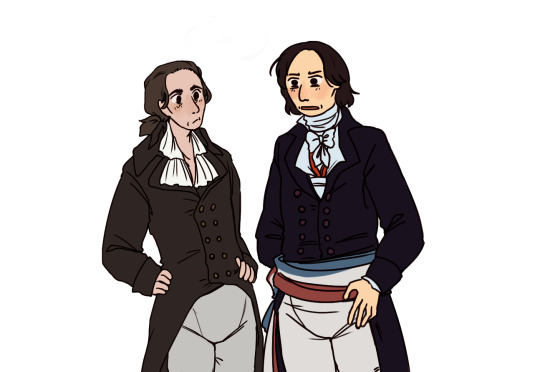
the worst duo ever
36 notes
·
View notes
Text
Hello citoyens 🇨🇵
I'm working on the Frev comic... But, I need your advice: it's better a Webtoon or a Book graphic novel?
I don't know what to dooooo
Please, help your commetteeee 🙏🏻
(You can also find me on my official IG: @melisvstheworld_ )

Thanks to all the citoyens who will help me 🙏🏻🇨🇵
(here is a tiny Robespierre for you)
#french revolution#louis antoine de saint just#maximilien robespierre#camille desmoulins#frev history#revolution francaise#frev#artwork#saint just#desmoulins#webtoon#danton#marie antoinette#marat#billaud varenne#collot d'herbois#la fayette#la revolution francaise#history#web comic#follow on instagram#follow my art#digital artwork
32 notes
·
View notes
Text

Second in the Mapping the CPS series: a map of Ancien Regime France with the places of birth of our notorious third CPS. On the side, you can see a timeline with the date of birth of each of the members.
Some fun facts:
The average age of the Committee of Public Safety in July 1793 was 37, with Lindet being the oldest at 47 and Saint-Just the youngest at 25.
Couthon and Prieur (Cote d'Or) share a birthday on the 22 of December.
Three of the members (Lindet, Robespierre and Carnot) were born in May (so the CPS has 3 birthdays coming up!)
The only deputy of Paris that was actually born in Paris was Collot.
I'm surprised Billaud-Varenne wasn't sent on mission to the West (instead of Prieur de Marne and Saint-André) since he was born in La Rochelle, had family there and lived there until he was 26.
Saint-André shares a birthplace with Olympe de Gouges (a rather small town called Montauban)
Where all the members were born:
Robert Lindet: Bernay
Jean-Marie Collot d'Herbois: Paris
André Jeanbon Saint-André: Montauban
Lazare Carnot: Nolay
Bertrand Barère:Tarbes
Georges Couthon: Orcet
Jacques Billaud-Varenne: La Rochelle
Pierre-Louis Prieur de la Marne: Sommesous
Maximilien Robespierre: Arras
Marie-Jean Hérault de Séchelles: Paris
Claude-Antoine Prieur de la Côte-d’Or: Auxonne
Louis Antoine Saint-Just: Decize
#frev#french revolution#robespierre#committee of public safety#saint just#lindet#collot#saint-andre#lazare carnot#barere#couthon#billaud varenne#prieur#herault
50 notes
·
View notes
Text

Double date gone wrong
26 notes
·
View notes
Text
Gonna make an edit of Barbaroux, Hérault, Collot, and BV with this audio lmao:
CC: This program is brought to you by Jabule Spicy Chicken, it’s delicious when there’s a red flag.
#frev#french revolution#they got j’s in their names too 😭#barbaroux#hérault de sechelles#collot d'herbois#billaud varenne
9 notes
·
View notes
Text
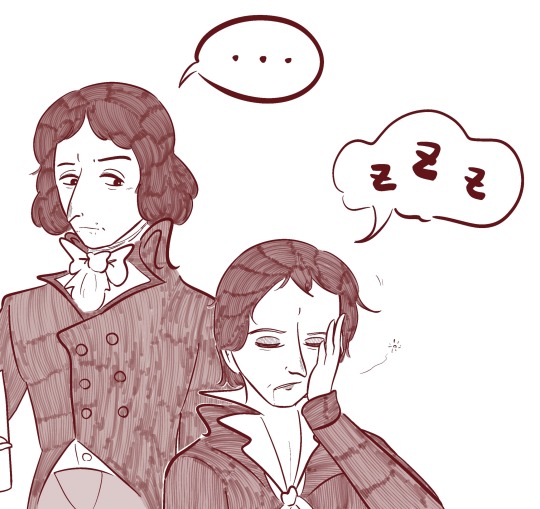
Today is Billaud Varenne’s birthday
give him a sleeping Collot and let him do whatever he wants 😋
20 notes
·
View notes
Text




Tallien coupe la parole à Saint-Just, exigeant que "le rideau soit entièrement déchiré", et Billaud-Varenne, qui vient d'arriver lui fait quitter la tribune avant d'exhaler sa haine sa rancœur née de son éviction des Jacobins la veille [...] Lorsque Robespierre essaye de parler, Collot, puis Tallien, armé d'un poignard, l'en empêche. [...] Pendant cinq heures, il est ainsi pris à partie, violemment par Collot, Billaud et Tallien, plus précautionneusement par Barere, avant que deux députés, Louchet et Lozère, demandent son arrestation.
----
Tallien interrupt Saint-Just, asking that "the curtain be torn down entirely", and Billaud-Varenne, who has just arrived, makes him leave the tribune before exhaling his hatred and resentment born of his eviction from the Jacobins' club the day before [...] When Robespierre tries to speak, Collot, and then Tallien, armed with a dagger, prevents him from doing so. [...] During five hours, he's targeted, violently by Collot, Billaud and Tallien, more carefully by Barere, before two deputies, Louchet and Lozère, ask for his arrest.
Jean-Clement Martin. Robespierre - La fabrique d'un monstre.
14 notes
·
View notes
Text
Leo Gershoy’s book on Barère has a few words to say about relationships among revolutionaries:

22 notes
·
View notes